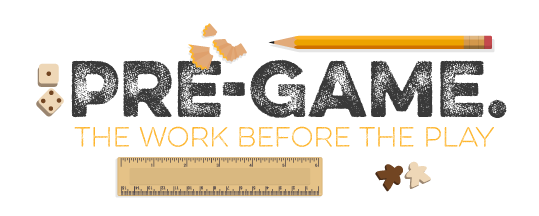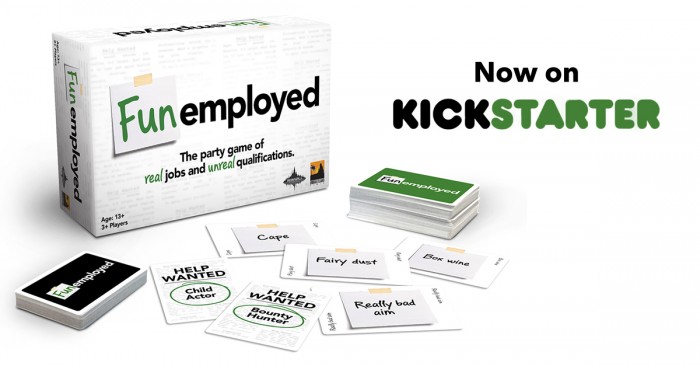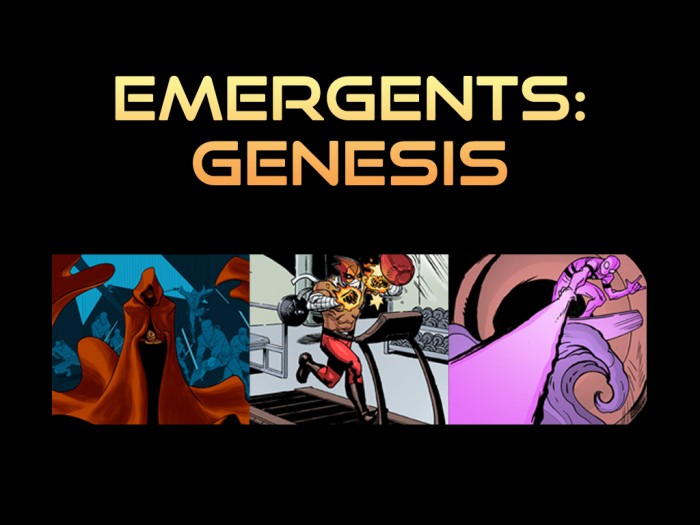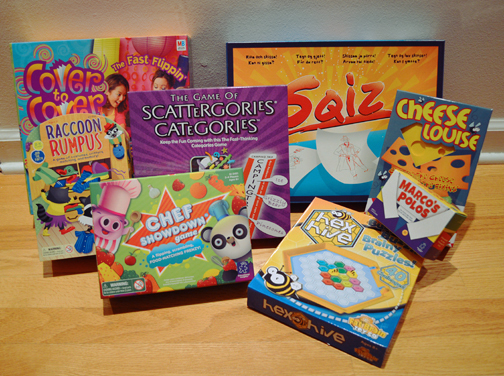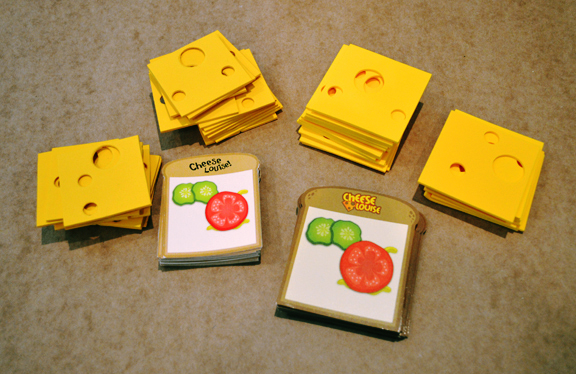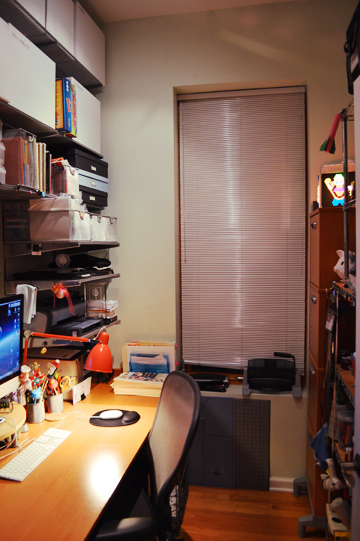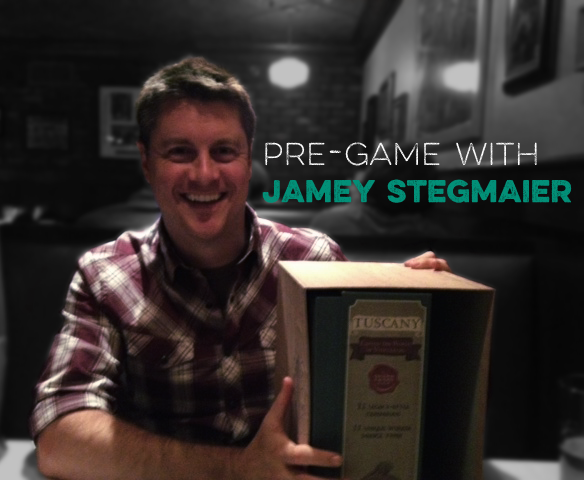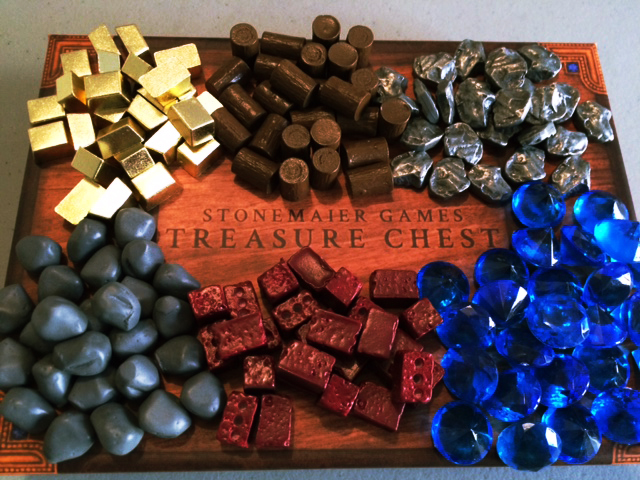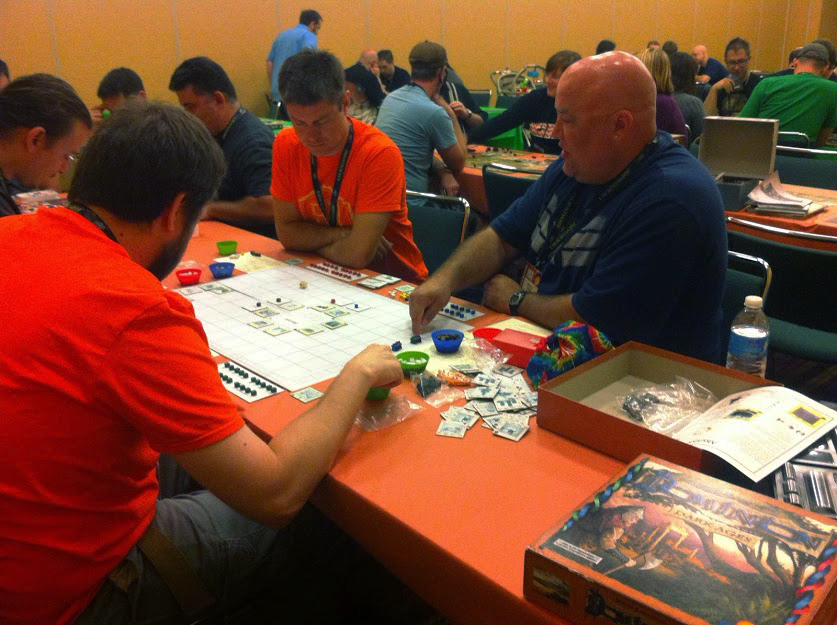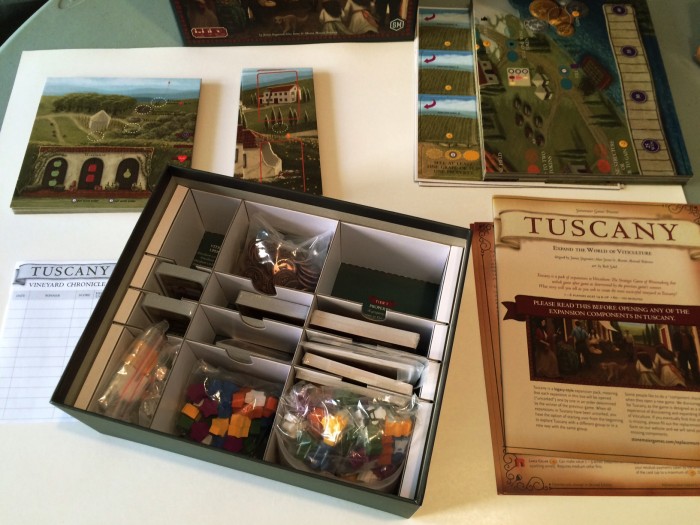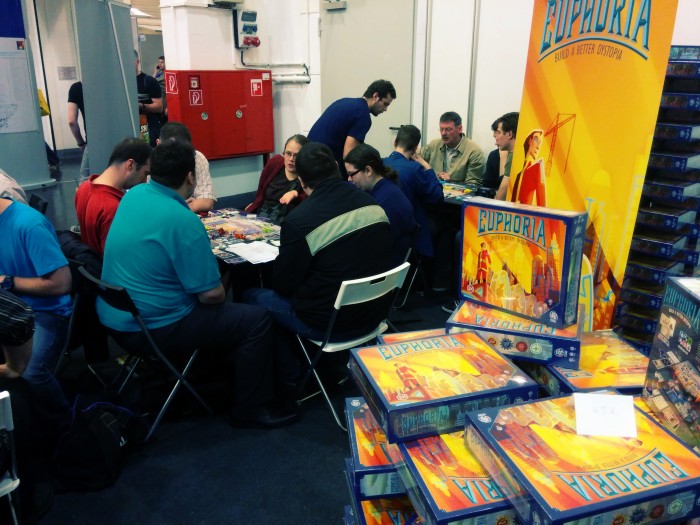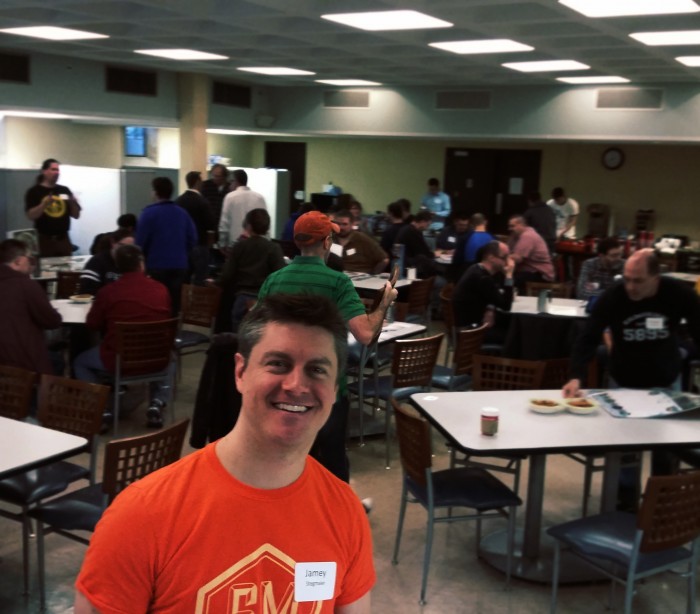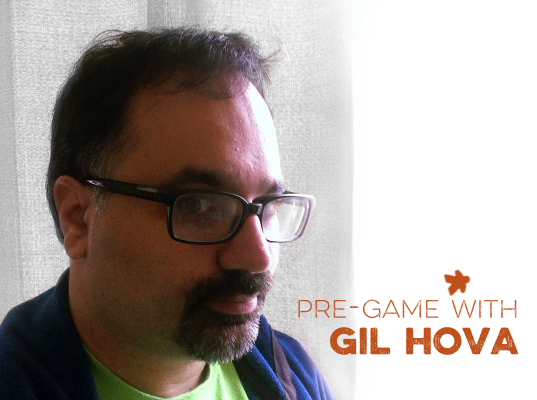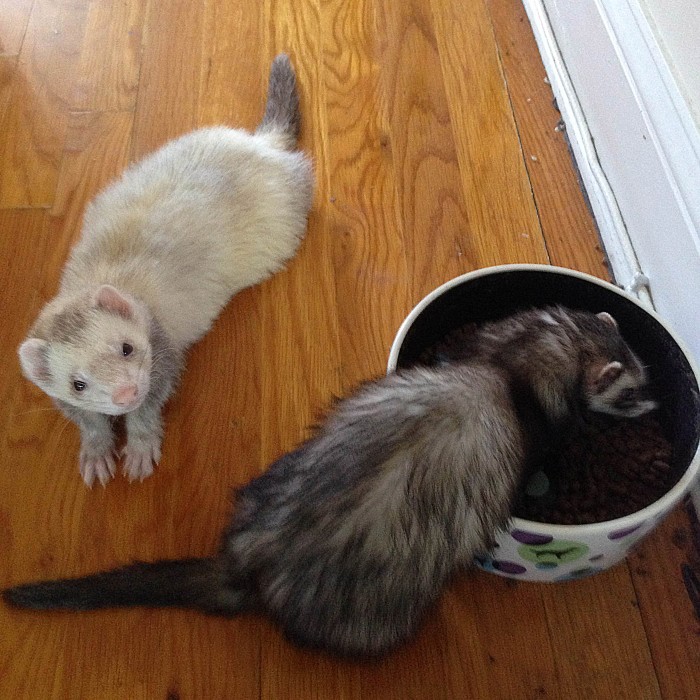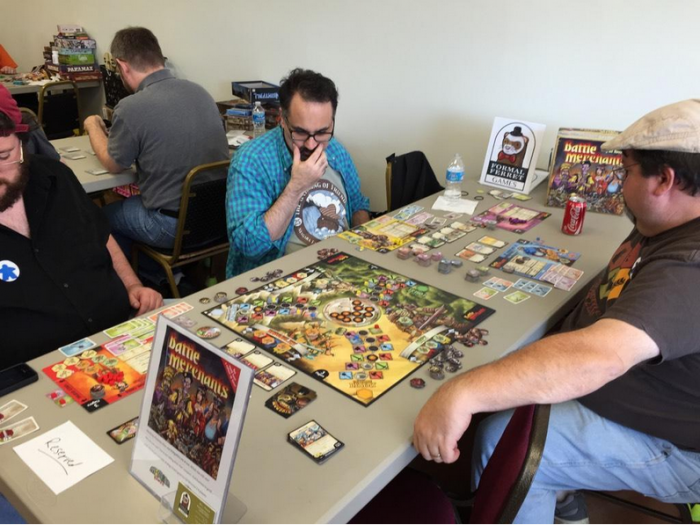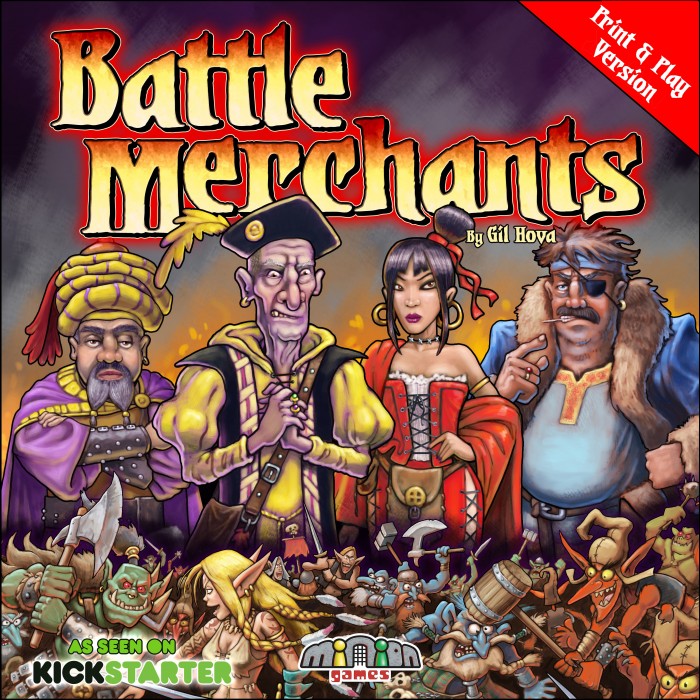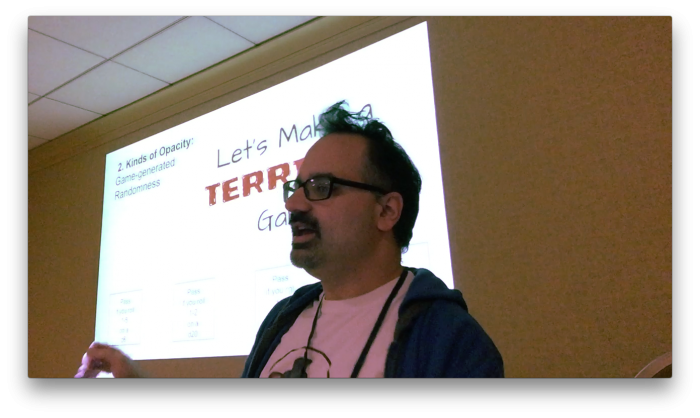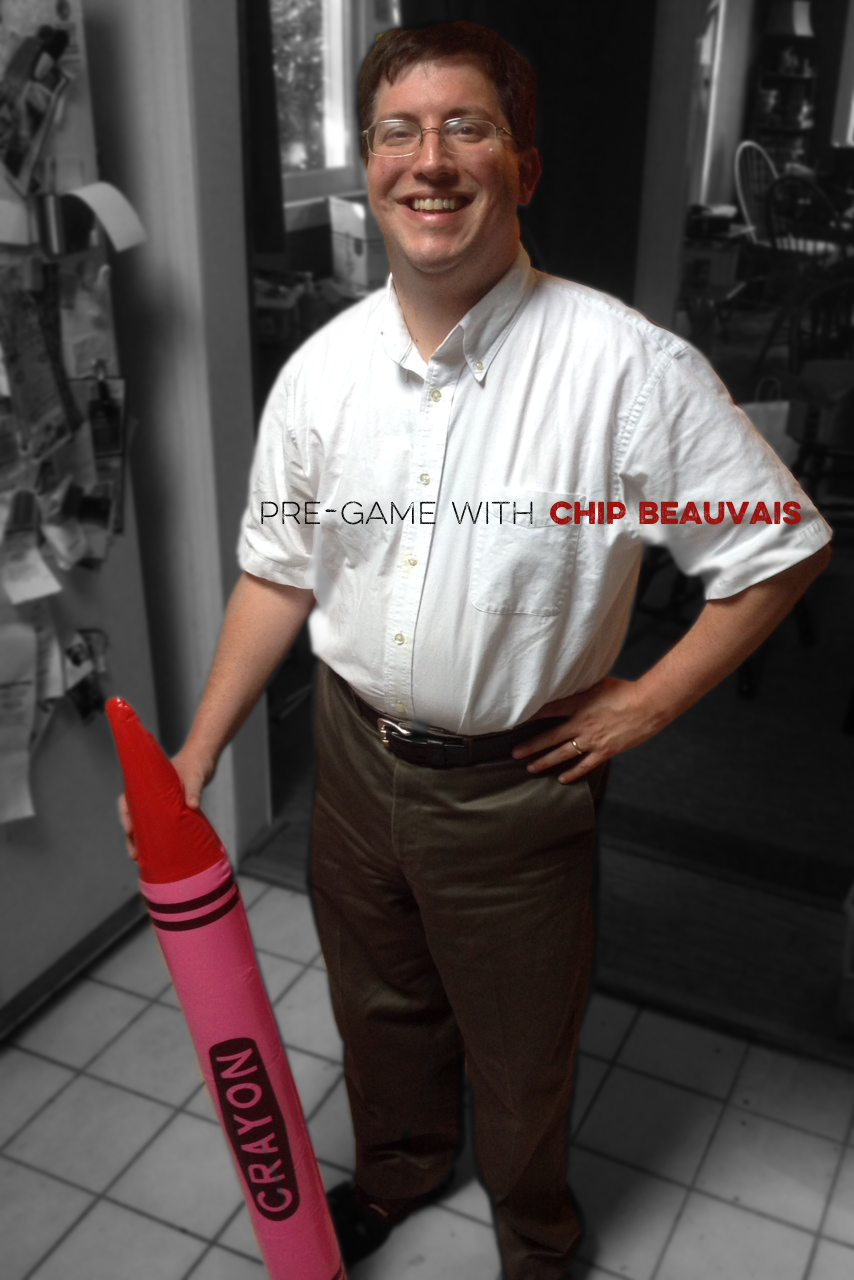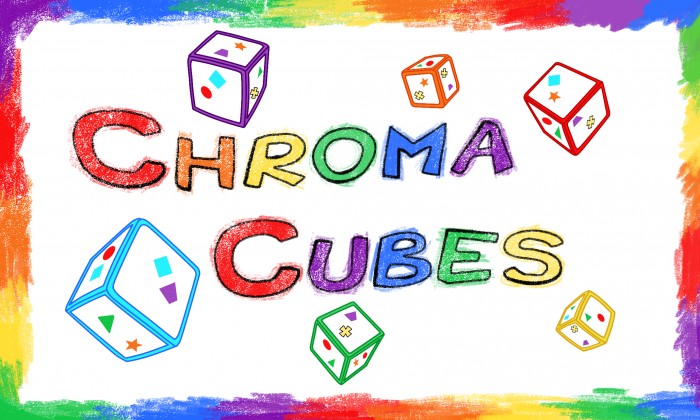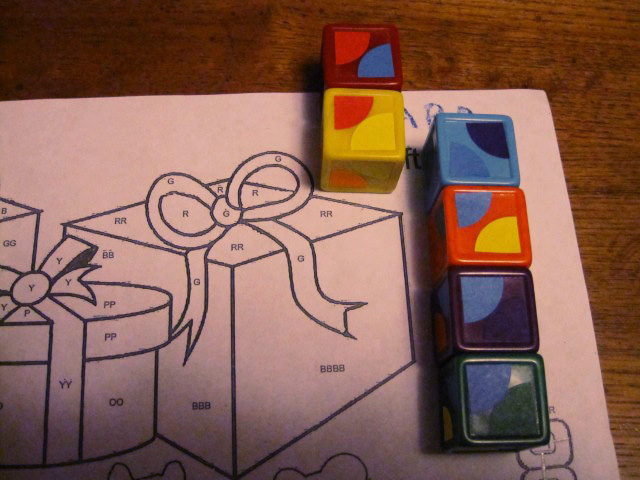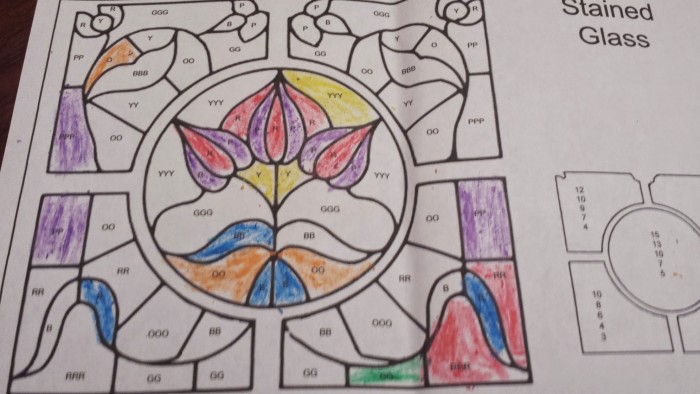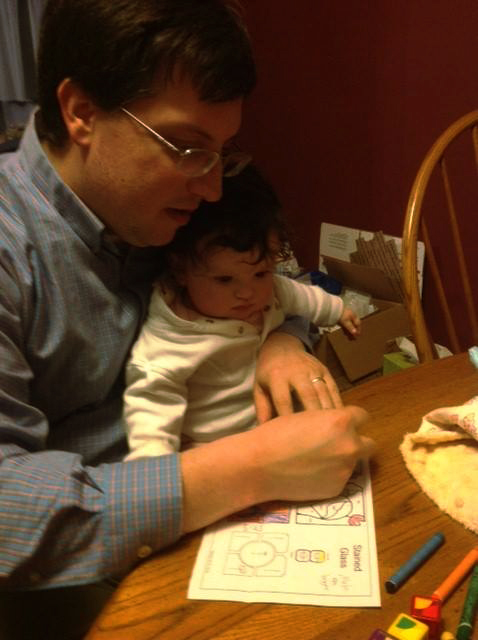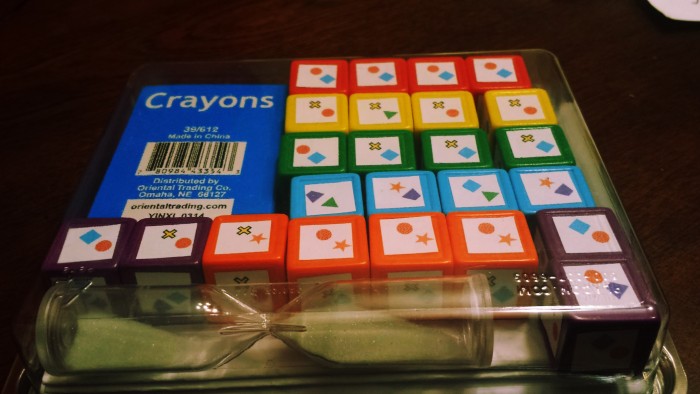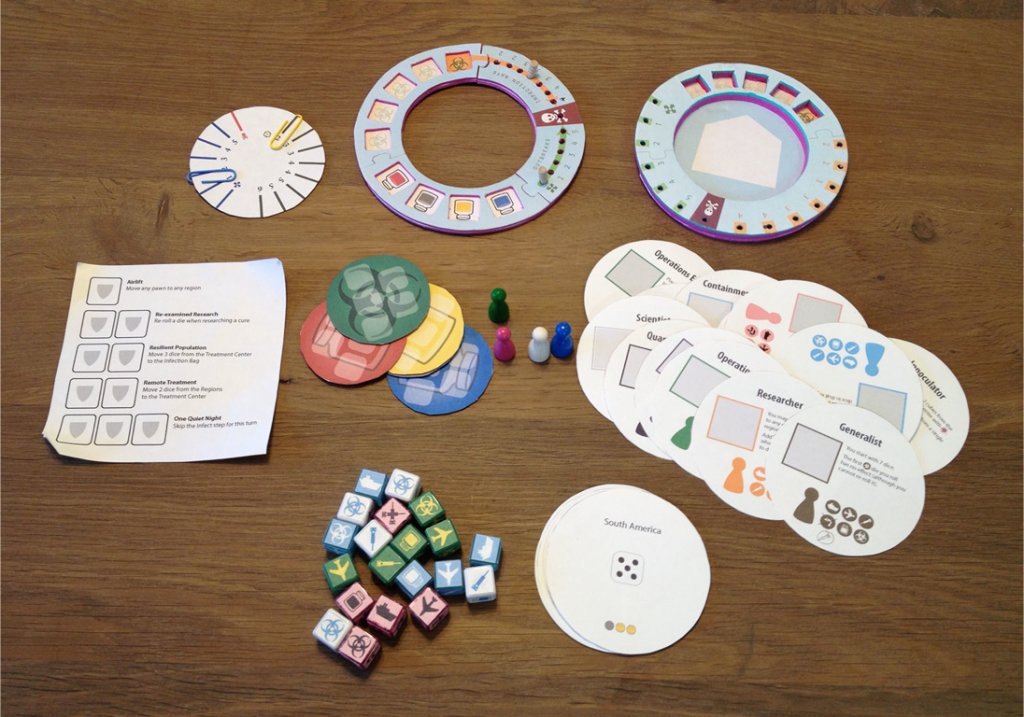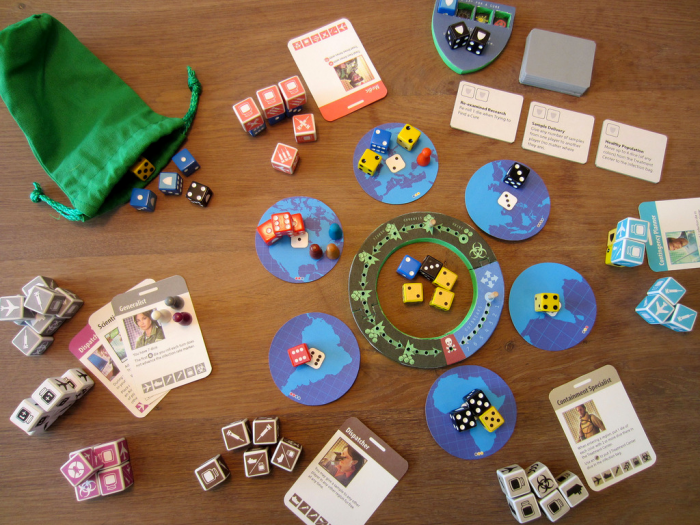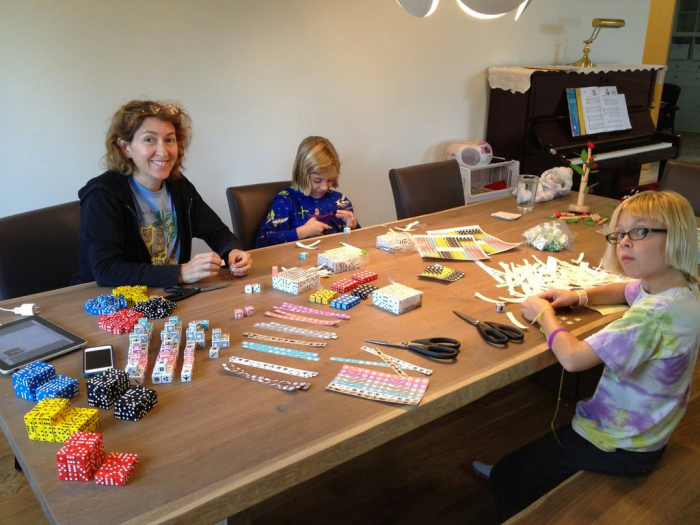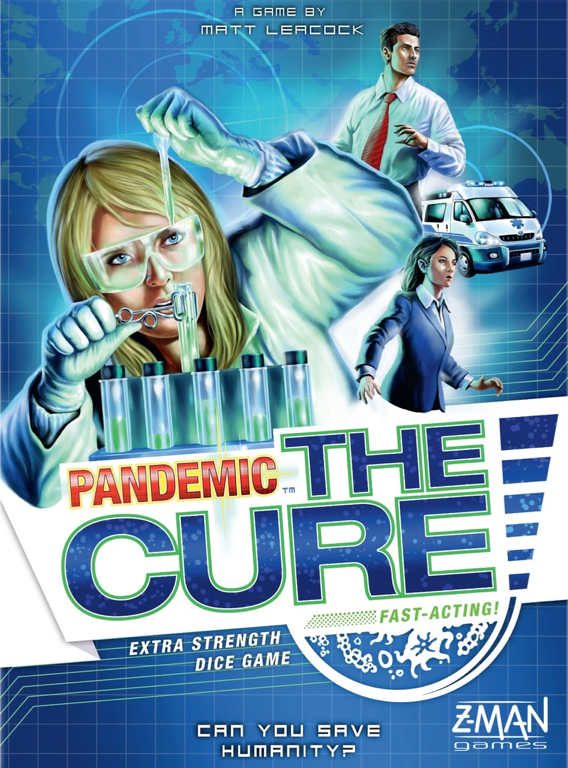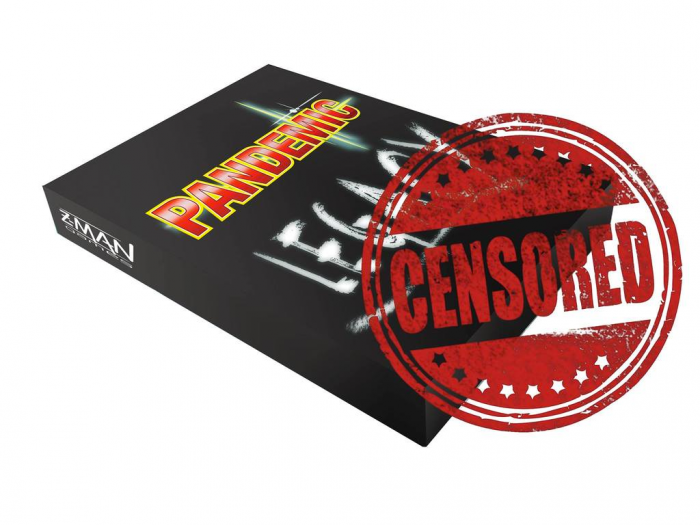
Gil Hova is the head of Formal Ferret Games, the designer of such titles as Bad Medicine, Battle Merchants, and Prolix, and an incredibly nice guy – which I can tell even though I only know him through the internets. We’ll get to game design (Gil was incredibly generous with information), but first things first: He’s the proud owner of two adorable fuzzy ferrets, and he sent me a picture:
Awwwww. Just look at them. I just wanna pet them and hold their little tiny paws and let them sleep on my chest…erm… back to game design. I apologize, for a moment I was contemplating converting this website into a ferret fan site.
This post has affiliate links, which directly support Andhegames.com at no extra cost to you. If you have any questions about anything recommended, let me know. – Andrew
Tell us about yourself – who are you? What do you do?
I’m a game designer living in Jersey City, New Jersey (just across the water from New York City) with my girlfriend Carrie and two cuddly ferrets. I’m in a transitionary period right now; I’ll be leaving my computer programming job at the end of November in order to do freelance work. I can’t get away with doing game design full-time yet, but my goal is to have a more flexible schedule so I can devote more time to designing, publishing, and coding games.
What board games are you playing most right now?
My favorite kinds of board games are heavy strategy Euros, so right now, games like Global Mogul and Kohle & Kolonie are getting lots of play. I just got my copy of Panamax, and I’ve played someone else’s copy of the game twice, but not my own yet. Looking forward to it!
But the games I’ve played most frequently in the last few weeks have been, of course, my own prototypes. I’m lucky enough to be able to test about once a week. It’s improved my designs considerably from when I was only able to test once a month.
One fact that we probably don’t know about you:
I used to work in film as a sound editor. My big claim to fame was working on the first two Pokemon movies. My name is in the credits and everything! (This makes Gil one of the coolest guys on the planet, in my book. -A)
I used to enjoy film back them, but I’ve never been into seeing movies ever since I got back into games. I guess I’d rather have control over my own story’s outcome.
What are you naturally good at that helps you in your work?
I’ve played games my whole life, and I’ve always been fascinated by their underlying systems. So I’ve developed a really quick, intuitive understanding of game systems and how they work.
One thing I’m naturally good at that has hindered my work: I like writing, drama, and a well-crafted story, and I majored in creative writing at school. But game design is not storytelling. You are not creating a narrative with your game; you’re giving players an opportunity to create their own narrative. As Eric Zimmerman so aptly puts it, games are not stories, they’re grammar.
What are you not naturally good at, that you’ve learned to do well anyway?
People. It’s a common gamer thing. I was very poorly socialized as a kid, so I had to learn how to talk to people in my late teens and twenties. Games helped me tremendously by imposing structure over a social endeavor.
I used to be a tremendous introvert, and in some ways, I still am. But people tell me that I come alive when I’m around games; my eyes just light up and I can’t contain my enthusiasm. I become strangely extroverted.
Describe your process (or lack thereof) when making games. How do you reach your final product?
The most important part of game design is playtesting. Constant, relentless, iterative playtesting. Every single part of the game has to be battle-tested, every part has to justify its existence. If some element of the game doesn’t contribute somehow to meaningful player choice or the overall player experience, it’s out.
That results in some harsh playtester feedback and difficult decisions, but it’s part of the territory. This is not an activity for the thin-skinned. And it’s worth it when I come out with a game that’s robust, resilient, and tremendously fun to play in any group.
What design-related media do you consume on a regular basis?
• I love the board game design community on Twitter, and I’m usually talking there at @gilhova. I read blog posts by folks like Daniel Solis, Kevin Nunn, and now you! (Didn’t I tell you he was nice? Thank you, Gil! -A)
• I love BoardGameGeek, and even though I don’t post there as much as I used to, I still stay on top of what people are talking about.
• I haven’t posted on /r/tabletopgamedesign (Reddit) in a while, but I’d like to start doing that again soon.
• I would love to listen to some more podcasts as well; I like what I’ve heard from Ludology, Cardboard Jungle, and On Board Games. (I was lucky enough to guest on Ludology once, and it was a blast!)
What are some tool/programs/supplies that you wouldn’t work without?
This is going to be a little techie, but: my favorite Secret Board Game Design Tool is FileMaker Pro. It’s a simple relational database program that has better graphic design features (like rotating text fields) than Microsoft Access.
Relational databases are awesome to do early-stage game design in. You can use table relationships to hold values or images across many cards in just one field. Change that one field, and you change it everywhere in the game. Much easier than doing it piecemeal. And I finally got around to getting the Adobe creative suite, so once I have numbers solidified, I can export my data as a CSV into InDesign, and that’s a very straightforward path to work in.
I’m going to start working in the digital space in December, so I’m very excited about picking up the Unity platform. I’m already pretty comfortable in C#, so it’s going to be a fun transition.
Finally: Google Docs is amazing for early-stage rulebooks. It’s so incredible to get instant feedback from my peers every time I have something for review.
What’s your playtesting philosophy? How often/early do you playtest?
Like I said before: playtesting must be constant, relentless, and iterative. I am not a fan of refining the idea or components to a game before the first playtest.
I like to bring a plain-looking prototype to the table early on, because I have no idea where the game is going to go. Game design is not a field for auteurs; it’s something where you have to study how people are reacting to the game, and if it is achieving the feelings you want. You’re not telling a story; you’re giving people the tools with which to tell their own stories. That’s a lot harder, and requires a lot more flexibility on the designer’s end.
There’s a well-meaning initiative called National Game Design Month (NaGaDeMon) that challenges people to “make” a game in one month. And that would be fine, except that the way they frame it, they want you to write the rules, make the components, and then play it once, and then you’re “done”.
Except you’re not done, not even close. This is as close to game design as selecting a font is to writing a novel. The difficult grind of making a game is not coming up with the initial idea, it’s the constant, relentless, and iterative playtesting. All the interesting stuff happens after that first playtest!
I know some people who do NaGaDeMon to get unblocked on their early-stage ideas, and that’s the only real good use for it. But personally, I’ve never felt crunched for ideas; it’s always the iterations that are difficult for me.
So I would hesitate to recommend NaGaDeMon to new game designers. It teaches you to sweat over things like card layout and rulebook formatting before the first playtest, and that is awful game design technique.
As a result, I’ve done is set up my own challenge in response. It’s called 4P, and it happens every January. Its challenge is different: you must playtest the same game idea four times in one month, incorporating the last playtest’s feedback into the next test. It’s a crazy pace for people who have things like full-time jobs and families (i.e. many game designers), but it will teach you good game design habits, and it will also hopefully get you to meet other game designers in your area. It’s amazing how much you will improve as a designer by giving other designers feedback.
What are some of the biggest obstacles you’ve faced in your work, and how have you overcome them?
I am an awful artist. I can barely draw a stick figure. My layout skills have improved to the point that I can present information somewhat painlessly, but I’m certainly not good at it yet.
Do you have a second job? If so, what do you do? If not, when/how did you quit your day job?
In a month, I will be between jobs. I’m not doing games full-time, but I’m working to maybe make that possible one day. In the meantime, I can at least arrange my life so my time is more flexible, and I’m able to do things like attend conventions as a vendor and run Kickstarter campaigns without worrying about vacation days, missing work deadlines, and having to choose between emergency off-hours support and time-sensitive game design work.
How do you handle family/life/work balance?
That’s so tricky! I’ve effectively been working two jobs for some time now. I’m hoping that my new life will promote a little more balance, but November alone will be insane for me, as I prep my party game Bad Medicine for a February Kickstarter launch with weekly playtesting and graphic design, harden my strategy game with more playtesting, prepare a game design seminar for Metatopia in New Jersey, run a Battle Merchants play-to-win tournament for BGG.CON in Dallas, and hold demos for Battle Merchants at game stores in Connecticut and Washington, DC.
Carrie has been amazingly supportive through all this. Her father and uncle both write professionally, so she understands the need to devote time to the creative drive. I am endlessly thankful that she’s a part of my life.
How many hours/week do you generally devote to game design? How many to other business-related activities?
I’m usually doing more business-ish things like self-promotion about 5-10 hours a week. I get maybe 2-5 hours a week of actual game design in, and then I spend about 5-10 hours a week playtesting.
Board games are finally getting to a point that video games and RPGs hit a few years ago, where it’s no longer an insane risk to self-publish. It’s still an enormous amount of work, yes, and it still takes a remarkable amount of time, money, and effort. But it’s no longer unreasonable. Just as an indie video game designer can release her game on Steam, and an indie RPG designer can release his game via PDF, an indie board game designer (which, to me, means a designer who self-publishes) can release her game using services like Kickstarter, Panda, Amazon Multichannel Fulfillment, and Impressions. It’s still a huge amount of work, money, and risk, but it’s no longer an insanely huge amount of work, money, and risk. The barriers have dropped enough so that it’s realistic for a designer, with considerable effort, to release his own professional-looking game.
I’m not a fan of paranormal romance personally, but there’s something Amanda Hocking once wrote on her blog that really stuck with me. She’s one of the first writers to really take off on the Kindle, so she was an example of a new kind of artistic entrepreneur: self-published, self-marketed, self-made. But she also wrote this:
I don’t think people really grasp how much work I do. I think there is this very big misconception that I was like, “Hey, paranormal is pretty hot right now,” and then I spent a weekend smashing out some words, threw it up online, and woke up the next day with a million dollars in my bank account.
This is literally years of work you’re seeing. And hours and hours of work each day. The amount of time and energy I put into marketing is exhausting. I am continuously overwhelmed by the amount of work I have to do that isn’t writing a book. I hardly have time to write anymore, which sucks and terrifies me.
As I enter the world of the self-publisher, I really see what she means. I spend a lot of time doing game design work that is not game design. It’s promotion, or research, or business planning. It’s all necessary, and I can see why someone like Jamey Stegmeier (who’s as similar a success story to Hocking as they come) works 10-hour days, even though he only releases about one game a year.
What’s the best advice about life that you’ve ever received?
One of the things about not being well-socialized is that I never really had a role model to look up to. But one thing I figured out: I don’t have to do what society expects of me.
I don’t mean basic things, like “don’t kill other people” or “wear pants when you go out in public.” That stuff, I have to do, no matter what. I mean more subtle things, like “if you don’t go to your senior prom, you will regret it for the rest of your life,” or “you will not be taken seriously as an adult if you don’t drink alcohol,” or “your life doesn’t have any meaning unless you have kids.” There are things about myself that I’m more secure and happy about now that I’ve accepted them as part of my nature, even if they’re different from everyone else.
I wish someone had given me that advice, and that I didn’t have to figure it out for myself. And it seems silly putting it into words. It’s not really advice per se; it’s more of a feeling that I had to live through in order to grok it. But once I did, I got a lot happier in life, I felt more in touch with myself, and I’m doing things I never would have been able to had I not been listening to my true nature.
What one piece of advice would you give aspiring game designers?
• Ideas are overrated. Don’t get attached to them. People don’t play ideas, they play games. Turn your idea into a game, get it onto the table, watch it crash and burn (which it will; that’s the nature of most early-stage games), then fix it and get it back on the table.
• Give yourself license to suck. Your early prototypes are going to be awful. Find early-stage playtesters (probably other designers) who don’t mind playing broken games, and keep hammering on that prototype. Question everything about the game, even that clever mechanism you built the game around. Especially the clever mechanism you built the game around.
• Forget about built-in talent. Everybody is awful at anything they try the first time, and game design is no exception. The more time you spend being awful at game design, the sooner you will find yourself no longer being awful.
• Make sure your skin is thick. Not so thick that you disregard playtest feedback, but enough so that you don’t treat your games like darlings that are to be cuddled and protected. Because after they go through the cauldron of playtester feedback, they will be rejected by publishers, ignored by con attendees, complained about within internet forums, and posted onto trade and auction GeekLists. That applies to all games, good and bad. So don’t think the harshness ever stops!
• Finally: playtest other people’s designs. It’s the best game design education you can have, because you will get to see what makes other games fail. That will teach you how to spot failures in your game more quickly.
I guess that was four pieces of advice.
(Five, by my count. 😉 Good stuff, isn’t it? –A)
Who would you like to see answer these questions?
I already called out Jamey Stegmeier. He’s been a huge inspiration for me, so I’d love to see him be a part of this!
(Jamey’s Interview is here! -A)



